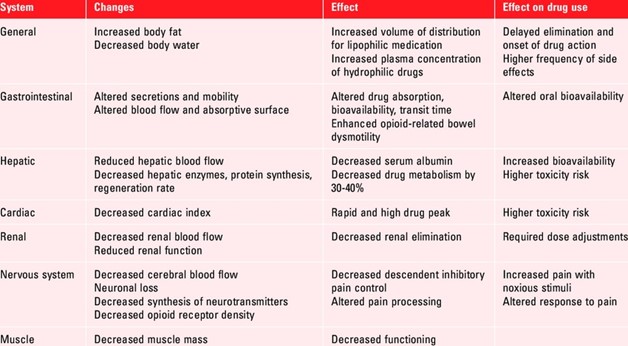A nurse is contributing to the plan of care for an older adult client. Which of the following physiological changes should the nurse recommend considering when administering medication?
Increased liver function
Increased metabolism
Decreased pulmonary function
Decreased kidney function
The Correct Answer is D
As individuals age, there is a natural decline in kidney function. This can result in a reduced ability to filter and excrete medications and their metabolites from the body. The decreased kidney function can lead to a longer half-life of medications, increased drug accumulation, and an increased risk of adverse drug reactions. It is important for the nurse to adjust medication dosages and frequencies based on the individual's renal function to prevent drug toxicity.
Increased liver function: Aging is associated with a gradual decline in liver function. While there may be some individual variations, in general, liver function decreases rather than increases with age. However, changes in liver function can affect the metabolism and elimination of medications. Some medications may require dosage adjustments based on liver function, but it is not a common physiological change in older adults.
Increased metabolism: Aging is generally associated with a decrease in metabolism rather than an increase. The metabolic rate tends to slow down with age, which can affect the pharmacokinetics of medications. Slower metabolism can result in medications taking longer to be metabolized and cleared from the body, potentially leading to prolonged drug effects.

Nursing Test Bank
Naxlex Comprehensive Predictor Exams
Related Questions
Correct Answer is B
Explanation
The nurse should include increased cardiac output as an expected effect of digoxin when reinforcing teaching with the client. Digoxin is a positive inotropic medication that strengthens the force of contraction of the heart, resulting in increased cardiac output.
Option a, increased heart rate, is not an expected effect of digoxin. Digoxin may actually decrease heart rate by exerting a negative chronotropic effect.
Option c, decreased urinary output, is not an expected effect of digoxin. In fact, digoxin does not directly affect urinary output.
Option d, decreased potassium level, is not an expected effect of digoxin. However, digoxin can increase the risk of hypokalemia, so it is important to monitor the client's potassium levels while on the medication.
Correct Answer is A
Explanation
a . Provide a tour of the perioperative area prior to surgery.
The correct answer is a. Provide a tour of the perioperative area prior to surgery.
Explanation:
When caring for an adolescent scheduled for surgery, providing a tour of the perioperative area prior to the procedure is an important action for the nurse to take. Adolescents may experience fear and anxiety related to the unfamiliar environment and procedures associated with surgery. Providing a tour allows the adolescent to become familiar with the surroundings, equipment, and healthcare team, which can help alleviate anxiety and promote a sense of control.
Explanation for the other options:
b. Explain that anesthesia is a special type of sleep: While it is important to provide information about anesthesia to the adolescent, describing it as a "special type of sleep" may be misleading. Anesthesia is a medical procedure that involves more than just being asleep, and it is important to provide accurate information to the adolescent.
c. Keep medical equipment out of the client's sight: While it is important to create a comfortable and non- threatening environment for the adolescent, completely hiding medical equipment may not be feasible or necessary. Instead, the nurse should address any specific fears or concerns the adolescent may have and provide age-appropriate explanations and reassurance.
d. Wait until after surgery to explain the importance of coughing and deep breathing: It is important to provide preoperative education to the adolescent to promote their understanding and cooperation. Explaining the importance of coughing and deep breathing before surgery helps the adolescent prepare and participate in their own recovery. Waiting until after surgery may result in missed opportunities for early postoperative interventions.
In summary, providing a tour of the perioperative area prior to surgery helps familiarize the adolescent with the environment, reducing anxiety and promoting a sense of control.
Whether you are a student looking to ace your exams or a practicing nurse seeking to enhance your expertise , our nursing education contents will empower you with the confidence and competence to make a difference in the lives of patients and become a respected leader in the healthcare field.
Visit Naxlex, invest in your future and unlock endless possibilities with our unparalleled nursing education contents today
Report Wrong Answer on the Current Question
Do you disagree with the answer? If yes, what is your expected answer? Explain.
Kindly be descriptive with the issue you are facing.
